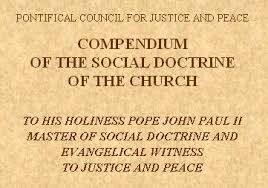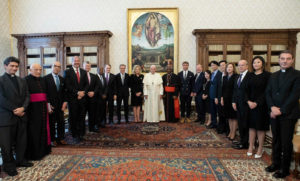Through business, people aim to gain some sort of profit, but for many this has become the sole goal. Rather than trying to help buyers through the goods or services sold, business people have begun to see buyers as consumers to foist their goods upon. With a revenue-driven society, the dignity of the human person has fallen out of the equation and the economy has adapted a view based on Social Darwinism. In order to ensure that “[m]an precedes the State,” society must once again see buyers as humans instead of consumers (Rerum Novarum 7). While profits are good and necessary for each person, they cannot become the end to which work is directed. Through Catholic Social Teaching, society can use a new form of economics which does not disregard the dignity of the person and fulfillment through only monetary gain.
Before the economy can begin to change, the people must change their hearts to show the rediscovered dignity of the person. Unfortunately, many people live in a very introverted fashion, thinking only about their wants and needs. People must realize that they must practice solidarity because they will “recognize that the social function of property and the universal destination of goods are realities which come before private property” (Evangelii Gaudium 189). The understanding that possessions come last will encourage the idea that people ought to work for one another, instead of just themselves. Once society recognizes this idea truly, then the economy can begin to change the way it operates.
The economy currently functions on an “eat or be eaten” mentality. Workers get exploited and new productions are constantly issued according to the newest “fad,” no matter the negative effects they may have on buyers. To change this view, manufactures must create based on legitimate need. This will lessen the stress on both workers and customers because the product does not get forced on them. The business will begin “to be directed towards the pursuit of the common good,” allowing the workplace to move away from the sole focus on earnings.
– Caritas in Veritate 36.
 In doing so, “the ownership of things may become an occasion of growth,” because the workers and superiors begin to feel connected through subsidiarity (Centesimus Annus 41) . They will own and take pride in their work, progressing towards the good of the company, which contributes to the common good of society by providing for others. Catholic Social Teaching creates a new form of economics by explaining that, although profit is both required and beneficial, it cannot override the necessity to treat workers and buyers with the respect that a person deserves.
In doing so, “the ownership of things may become an occasion of growth,” because the workers and superiors begin to feel connected through subsidiarity (Centesimus Annus 41) . They will own and take pride in their work, progressing towards the good of the company, which contributes to the common good of society by providing for others. Catholic Social Teaching creates a new form of economics by explaining that, although profit is both required and beneficial, it cannot override the necessity to treat workers and buyers with the respect that a person deserves.
Many people think that the Catholic view of an economic system is too idealistic and based on a “best-case scenario” view to actually function in the real world, however, this is not the case. Catholic Social Teaching simply describes a society with a change of focus from monetary gain to the human person. The new view would prevent the “[alienation] of… social organization [because] production and consumption [would not] make it more difficult to offer [the] gift of self and to establish solidarity between people” (Centesimus Annus 41). Through this, the legitimate needs of the person becomes the center of societal functions, instead of the money that be gained through him.
— K., Machebeuf Student
This blog post is a contribution from a member of the senior class at Bishop Machebeuf High School in Denver, Colorado. The seniors take an in-depth course in Catholic Social Teaching during their fall semester, with the Compendium of the Social Doctrine of the Church as their key text, supplemented by the more recent writings of Pope Emeritus Benedict XVI and Pope Francis. Catholic Social Teaching is meant to be shared, so the students write, not simply to demonstrate their understanding, but also to communicate the truth of Christ to the wider Denver and digital community through Attollo. We hope you enjoy and are challenged by the writing of these amazing seniors!




